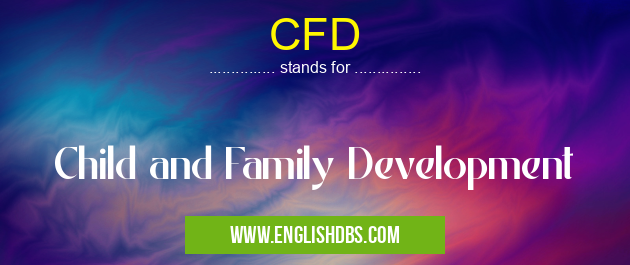What does CFD mean in DEVELOPMENT
Child and Family Development (CFD) is an interdisciplinary field which studies the physical, intellectual, emotional, social and spiritual aspects of child development. It examines how children are affected by their environment, both at home and in the wider community. It looks at the family dynamics and how these affect child development. CFD also explores the factors that influence parenting styles, such as culture, poverty, education levels and support services. The goal of CFD is to ensure healthy growth and development for children within the context of their families.

CFD meaning in Development in Community
CFD mostly used in an acronym Development in Category Community that means Child and Family Development
Shorthand: CFD,
Full Form: Child and Family Development
For more information of "Child and Family Development", see the section below.
» Community » Development
Definition
Child and Family Development provides a multi-disciplinary approach to understanding the individual needs of children from birth through adolescence. By studying various aspects of children's physical, intellectual, emotional, social and spiritual development, CFD professionals can better understand how environmental influences — such as family structure or socio-economic status — affect a child's overall wellbeing. Through research-based data analysis combined with clinical assessment methods such as interviews and psychological tests, CFD specialists can develop comprehensive assessments that provide insights into children's development. This information can be used to create tailored recommendations that promote healthy growth within the context of each family's unique circumstances.
Essential Questions and Answers on Child and Family Development in "COMMUNITY»DEVELOPMENT"
What is Child and Family Development?
Child and Family Development (CFD) is a field of study that focuses on the physical, behavioral, emotional, and intellectual development of children in the context of family relationships. It examines how families interact with each other and their environment, both inside and outside the home, to foster healthy development. It also looks at how dynamics within the family shape a child's growth.
Who benefits from Child and Family Development?
Parents, children, educators, clinicians and social workers can all benefit from CFD. The knowledge gained can help create better strategies for managing behaviors within the home, as well as providing increased insight into preventive strategies for developing healthy families.
How does CFD apply to parenting?
CFD recognizes the relationship between parents and their children as primary influences in a child's development. Research suggests that parental guidance—including positive reinforcement of desired behavior—has long-term implications on a child's academic performance as well as their emotional health. Parenting strategies based on careful observation of a child's behavior may help reduce challenging behaviors while building confidence and successful learning experiences.
How is CFD used to support children's learning?
By incorporating an understanding of family dyanamics and behaviour patterns into the educational setting, teachers can use CFD to adjust instruction based on individual needs. This includes implementing creative instructional methods such as hands-on activities or guided discussions to appeal to different learning styles or enhance overall comprehension. In this way, CFD helps educators create an engaging learning experience for every student.
How does CFD address mental health concerns?
Mental health concerns within families are often complex issues needing special care and attention. By identifying any underlying causes contributing to behaviors of concern—such as anxiety or depression—mental health professionals may be able to provide more comprehensive solutions than those addressing only symptom management alone. With a holistic approach emphasizing positive communication between parents and children, practitioners utilizing CFD principles aim to promote healthier outcomes for all involved in difficult situations.
How does culture play a role in Child and Family Development?
Each family has its own unique culture which shapes how individuals define themselves within it — including how they relate to one another and form attachments with each other over time. In addition, cultural values often impact expectations regarding discipline styles parenting roles among others topics related to household dynamics. Practitioners must take these considerations into account when supporting families by striving for culturally appropriate interventions.
How can I stay up-to-date on research in Child & Family Development?
There are many publications dedicated solely towards researching topics related to CFD such as The Journal of Child & Family Studies which publishes empirical studies exploring topics such scaffolding interactions between parents/caregivers/and young ones; parenting self-efficacy; cross-cultural understandings; developmental trajectories; fatherhood; adoption; resilience; etc.. Additionally attending conferences related specifically to CDF may also be helpful in keeping abreast with any new findings.
Final Words:
Child and Family Development offers an invaluable set of tools for promoting positive outcomes in a wide variety of settings. By taking into account both individuals' specific needs and familial contexts, it enables a holistic approach to improving quality of life for all members of society — including those who may otherwise go overlooked or underserved by other forms of professional care.
CFD also stands for: |
|
| All stands for CFD |
